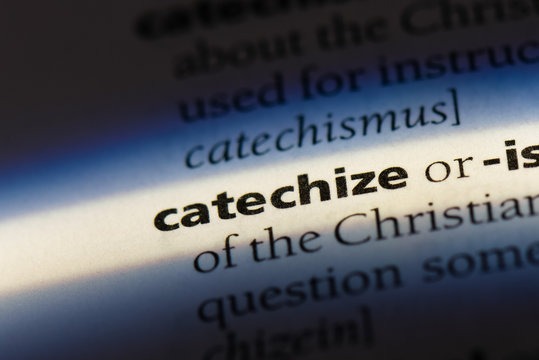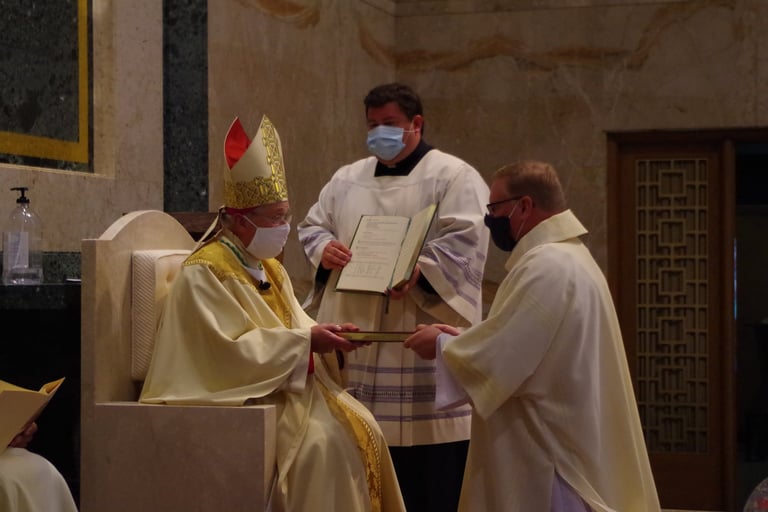Evangelize – Proselytize – Catechize. What is the difference?
Authority to Teach
CATECHISM


Evangelization and proselytization are both acts which are done with the hope of converting someone from a particular religion, or no religion, to another religion. Evangelization, when done properly, is the sharing of one’s faith in a non-confrontational manner with the hope that the sharing sparks an interest in the listener and the conversation continues. Proselytization is a more direct, confrontational approach that tries to convert a person by making them believe that a particular way is the only right way and that you must believe that way as presented or suffer the consequences. Proselytization has never been overly successful and is illegal in some countries. It never less remains one of the most popular ways to try to convert people to a particular way of thinking. To catechize is to instruct someone in the principles of a religion (most commonly associated with Catholicism) by means of question and answer, typically using a catechism. Catechism continues what evangelization begins.
This blog is a bit of both evangelization and catechization. It is my way to share my faith with you while providing some instruction and explanation on why Catholics believe what we believe. Going through RCIA the second time with my wife and son I found that I like to share my faith. More so, I found that I enjoy explaining or teaching why we believe what we do. There is no end to the number of people, Catholic or not, who are willing to tell you why we believe and do what we do. Unfortunately, the number of people who get it wrong are more numerous than the web pages that will back up their claims. The Church, at least in America, has done a poor job through the ages in properly catechizing the faithful. As a result, we have a church full of people who stand together on Sunday and proclaim, “I believe….” But then get to the parking lot and say, “But I think the Church is wrong on….”
The Catholic Church has the magisterium. The magisterium is the authority that spells out exactly what the authentic teaching of the Church is. It stems from apostolic succession. Jesus taught his disciples and gave them the authority to teach their replacements. The replacements came to be known as bishops. Bishops have the authority, responsibility, and duty to teach the authentic teachings of Christ to the faithful. The magisterium consists of the pope and the bishops in union with him.
What the magisterium ensures is that every Catholic Church teaches the same thing no matter where they are in the world. Truth and teaching are not left up to the individual parish or person to define for themselves. Jesus taught his disciples one way, one truth. Today we have over 40,000 Christian denomination and non-denominational churches throughout the world, each teaching what they believe to be the truth. I think it is safe to say that there are not 40,000 different versions of the one truth.
The Catholic Church is the only church that can back up a claim of having an unbroken line of apostolic succession leading directly back to Jesus himself. What the Church teaches today is exactly what the first disciples taught and received directly from Jesus. Church teaching may have been clarified through the years but it has never changed, even during the bad years of even worse popes. No matter how corrupt they may have been, none of them changed Church teaching, even to benefit themselves.
The key word behind teaching a faith is authority. By whose authority are you teaching? If I were to show up at your house and demand you let me in because I was with the FBI, I would be in a lot of trouble. I am not there with the authority of the FBI. The same is truth with faith. Am I teaching the faith according to Christ or am I teaching the faith according to Bob? Where does my authority come from? For a Catholic, the authority to officially teach the faith (catechize) comes only from the diocesan bishop. All Catholics are called to evangelize their faith as a mandate of their baptism, but only those with the bishop’s approval may officially teach the faith.
As a deacon of the Roman Catholic Church, I have my bishop’s approval to officially teach the faith. This is both a tremendous honor and an immense responsibility. When we are ordained, we are handed the book of the gospels and instructed –
“Receive the Gospel of Christ, whose herald you have become: Believe what you read, teach what you believe, and practice what you teach.”
I am to teach what the Church teaches, regardless of my opinion on it. Where my opinion differs from the Church, I am to seek understanding on why my opinion is wrong. Anyone who disagrees with an official Church doctrine does not disagree with just the Church. Ultimately, they disagree with Jesus himself.
I am not perfect and I am not all-knowing, but I will do my best to bring to you the Catholic faith in a way that is understandable, enjoyable, and correct.


Evangelizing Worldwide
© 2025. All rights reserved.


Contact Me

